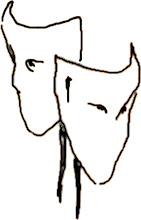Directors read. Directors read a lot. One of the first things we do when beginning a new production process is try to immerse ourselves as much as possible in the world of the play. This takes many forms: iPod playlists, collections of art and poetry, handwritten lists of images and sense-responses to the text, and often the reading of a great many books and articles. We go through a lot of highlighters. Knowing the history a story is set against is a critical component of the given circumstances in which the characters operate. Other people’s ideas, whether you find yourself agreeing with them or not, are great levers for prying open the text, tipping you off to angles of analysis and approaches to thinking about the play you may have otherwise missed entirely.
One of the first things that jumped out at me immediately when beginning this work was the incredibly broad range of disparate literary works the period produced – so much so that I found myself stopping everything else to assemble a timeline of when they were published. Arranging them in order is like looking at a fantastic cross-section of the ideas that were at play shaping people’s lives during the reign of Victoria in England.
More on this to come…in the meantime, here’s the list:
Timeline of Victorian Era Literature
1813 – Pride and Prejudice, Jane Austen
1819 – Ivanhoe, Sir Walter Scott
1833 – Ulysses, Alfred Lord Tennyson
1837 – Begin Reign of Queen Victoria
1837 – The French Revolution: A History, Thomas Carlyle
1839 – The Adventures of Oliver Twist, Charles Dickens
1841 – On Heroes and Hero Worship, Thomas Carlyle
1843 – A Christmas Carol, Charles Dickens
1844 – The Condition of the Working Class in England in 1844, Friedrich Engels
1845 – Essay on the Development of Christian Doctrine, John Henry Newman
1850 – David Copperfield, Charles Dickens
1854 – The Charge of the Light Brigade, Alfred Lord Tennyson
1854 – Walden, Henry David Thoreau (United States)
1859 – On the Origin of Species, Charles Darwin
1859 – A Tale of Two Cities, Charles Dickens
1859 – Rubaiyat of Omar Khayyam (trans.), Edward Fitzgerald
1859 – On Liberty, John Stuart Mill
1861 – Great Expectations, Charles Dickens
1864 - Apologia Pro Vita Sua, John Henry Newman
1865 – Alice’s Adventures in Wonderland, Lewis Carroll
1872 – Through the Looking-glass, and What Alice Found There, Lewis Carroll
1879 – Euclid and his Modern Rivals, Lewis Carroll
1883 – Treasure Island, Robert Louis Stevenson
1885 - Idylls of the King, Alfred Lord Tennyson
1885 – Thus Spoke Zarathustra, Friedrich Nietzsche
1886 – Strange Case of Dr. Jekyll and Mr. Hyde, Robert Louis Stevenson
1887 – A Study in Scarlet, Sir Arthur Conan Doyle
1888 – A New English Dictionary (OED), Vol 1
1890 – Gunga Din, Rudyard Kipling
1891 – A Scandal in Bohemia, Sir Arthur Conan Doyle
1891 – Rerum Novarum “Rights and Duties of Capital and Labor” – Pope Leo XIII, influenced by Henry Edward Cardinal Manning
1893 – The Final Problem, Sir Arthur Conan Doyle
1894 – The Jungle Book, Rudyard Kipling
1895 – The Importance of Being Earnest, Oscar Wilde
1897 – Dracula, Bram Stoker
1899 – Rudyard Kipling
1901 – End Reign of Queen Victoria
1902 – The Hound of the Baskervilles, Sir Arthur Conan Doyle
1923 – Saint Joan, George Bernard Shaw





I'm an avid reader of all things from the Victorian & Regency period. I don't know why, but that period of history just fascinates me. I guess it was that so much change occurred over just a few generations. History repeats itself, and I see many parallels between where Great Britain was during their "golden age" under Queen Victoria to where the US has been in the 20th century. I look forward to seeing how your troop interprets this period through the words on Conan Doyle. -HM
ReplyDelete